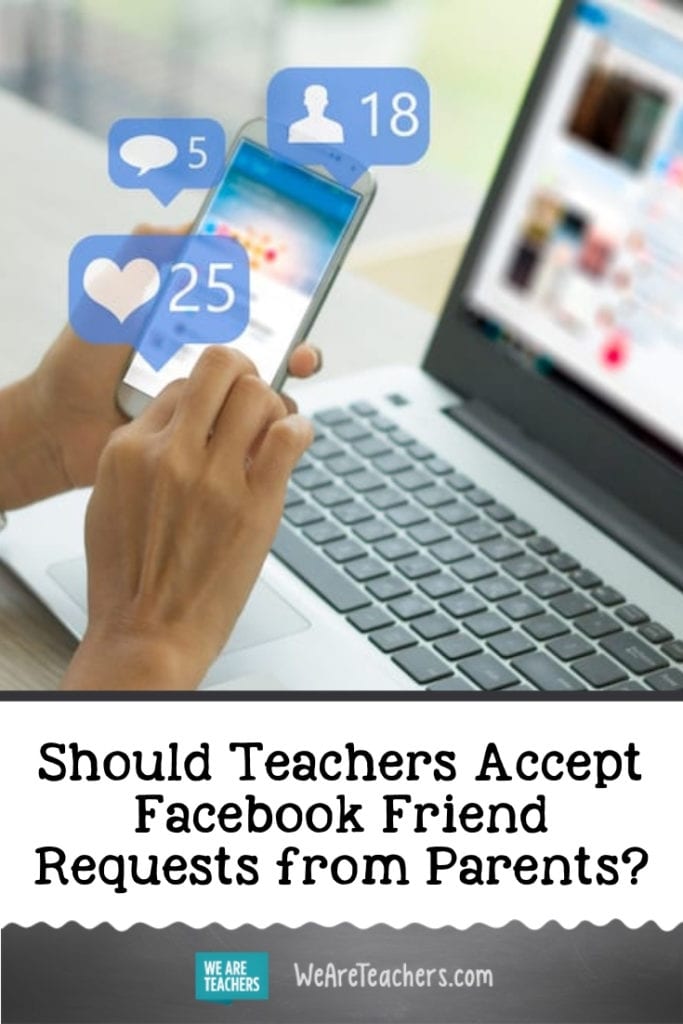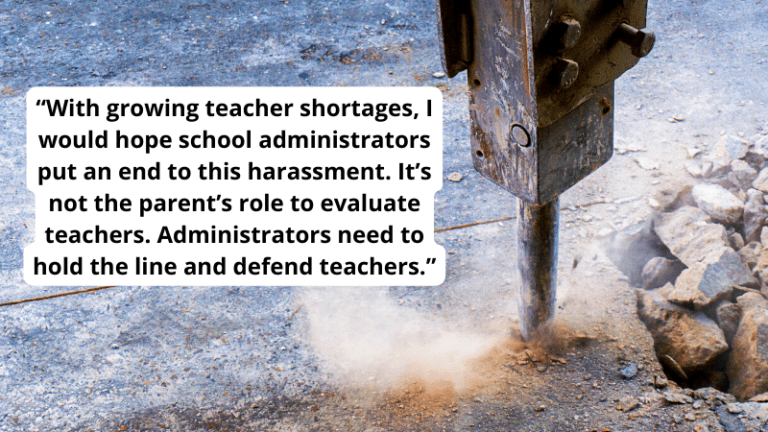You know the drill. You open Facebook to wind down at the end of the day and there it is. A notification that your student’s parent has sent you a friend request. You pause and debate whether to accept because we all know that teaching is most effective when we have strong relationships with students, parents, and caregivers. But we also know that when those relationships shift from professional to personal it can be difficult, if not impossible, to maintain boundaries.
Many of us worry that if we connect with parents online through social media platforms like Facebook that we are crossing a line. Yet, we recognize that communicating with parents through social media makes it more likely that they will respond to us, which benefits our students. So what is a teacher to do? In the day and age of COVID-19 and online teaching, should we accept parents’ friend requests on Facebook? We took the question to our WeAreTeachers HELPLINE group and … the results were mixed. There are definitely some pros and cons to explore!
Before you get started … your district might have a policy for this
In some cases, the answer to this question might be simpler than you think. Many districts have a policy that prevents teachers from accepting Facebook friend requests from students and their parents. However, these policies vary, and some districts don’t have one. If your district doesn’t have a policy, talk to your administrator before you make a decision. The last thing you want to do is accept friend requests and then have to unfriend them. This can cause confusion and hurt feelings. But if you do have a choice …
The case for rejecting parent requests
Some of our teachers feel Facebook and social media is not the place for a parent-teacher connection.
Remember, you are a mandated reporter
In most states teachers are required by law to report child abuse and neglect. Here is a list of state-by-state requirements. When you accept a parent’s friend request, you will see photos, posts, and other personal information, depending on what they share. If you see something that suggests abuse or neglect, you must report it. Some teachers just don’t feel comfortable crossing the line between home and school, so this may impact your choice.
Boundaries in teaching are complicated enough
As teachers, we are always trying to navigate the line between building a relationship with a student and being that student’s friend. When we start accepting parents’ friend requests we need a whole new set of boundaries. Amber Rae, a teacher in Ohio, decided it was too much. “I want to keep my personal life and my professional life completely separate,” she shares.
You may feel the need to censor yourself
If you use Facebook to express your views on politics, religion, or current events, you may worry that parents won’t agree with you. Or even worse, they may fear you’ll be sharing certain points of view with your students. If you accept parent requests, your Facebook page may need to change from being private and personal to public and professional. If you don’t want to second guess yourself every time you post, then don’t accept parents’ friend requests.
The case for accepting parent requests
On the flip side, some teachers are all for more communication routes.
Parents are more likely to communicate this way
One of the pros of accepting parents’ friend requests is that they are more likely to communicate with you on social media. Emails tend to get lost in the shuffle, and not all parents pick up the phone or log into school communication apps. As long as there are clear boundaries, and the communications are focused on the student and school information, this option works for many teachers.
For some teachers, it is more equitable communication
Susan Borst Heard, a high school teacher in Kentucky, found that many of her students’ parents use temporary cell phones and their numbers changed monthly. The Facebook page stayed the same. She was able to share important information and maintain consistent contact with parents because of Facebook.
The more you know, the better you can connect
Christine Holtajer, a middle school teacher in Georgetown, Kentucky, was able to get to know her students’ families better once she was friends with them on Facebook. She keeps parents updated and informed and shares important school information. She thinks the best part of being friends with parents on Facebook is that she can learn about her students from their parents’ posts. “I can ask them about the fish they caught or the trip they took,” she says.
When it comes to conversations, take it to email
It doesn’t happen very often, but sometimes communication with parents and caretakers can get heated and accusatory. Whether you choose to be Facebook friends or not, communication is best had via email so that you have a record of what was said and when. One teacher recommends using school communication channels so you have a paper trail. If you are using a personal social media account, you are blurring the lines between school communication and personal communication. Keep it simple and use approved school communication tools in case a parent or caregiver is crossing the line between personal and professional.
An alternative is a class Facebook group
If you’re still not sure but you’re looking to compromise, consider creating a class group on Facebook. Many teachers use Facebook groups to share important information and updates with families. A few things to keep in mind … Create a group and not a page, as pages are public, and groups are private. And, if you plan to post photos of your students, you need to get parent permission. Check with your school secretary to see if your school has a form for this request.
Do you accept Facebook friend requests from parents? We’d love to hear your thoughts in the comments.


